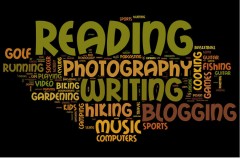 By Shanna Mallon
By Shanna Mallon
Want to take your writing up a notch?
Here’s a tip: Improving your skills as a writer don’t have to happen at the computer screen.
If you’re serious about improving your writing for clients or just for your own satisfaction, there’s more to it than, “just write.”
Writing and Other Hobbies
There’s a few related hobbies that can boost brainpower, get those creative juices flowing, and help you hone those important writing skills.
Reading: “If you want to be a good writer,” says author Stephen King, “you must do two things above all others: Read a lot and write a lot.”
Exposing yourself to good writing helps you understand it better, and know how to create it. Read classics, read your favorites, read authors who are highly recognized and acclaimed.
You’ll learn to recognize what makes good writing, and you’ll write better as a result.
Physical Activity: Exercise is good for more than the body. According to a study by the Department of Exercise Science at the University of Georgia, just 20 minutes of daily exercise facilitates information processing and memory functions.
When you increase your heart rate and get your blood moving with physical activity, you tell your body to pump more oxygen to the brain, as well as release a bunch of brain-stimulating hormones.
Make it a habit to get moving! Your writing will thank you.
Journaling: Journaling, particularly away from a computer screen with pen and paper, is a great way to get extraneous thoughts out of your head. Sometimes just taking the time to dump out your thoughts is all it takes to open your mind up for great creative ideas.
Watching Movies: Like all good novels, movies revolve around story. Story is at the heart of most content you will write.
It doesn’t matter whether you’re writing a news release to tell the story of a company’s new product, or a blog post to tell the story of strategies that work for social marketing, you are always writing to people. People like narrative.
By taking some time to watch movies and documentaries, you expose yourself to the basic principles behind what makes all great narratives work.
Traveling: Author Alain de Botton writes in The Art of Travel that there is “an almost quaint correlation between what is in front of our eyes and the thoughts we are able to have in our heads.”
In other words, regularly exposing yourself to new environments and settings is a useful tool for boosting creativity.
Mind Games: Playing a game of Scrabble or completing a crossword can be more than a fun distraction.
It’s also a useful habit for keeping your mind sharp.
When you stimulate your brain through recreation, you also stimulate it for writing work.
As a writer, do any of the above hobbies and exercises sound familiar to you? Are any these already regular habits and activities in your life? What other hobbies may be helpful in developing your writing skills? Let me know in the comments.
Image courtesy of Metzger Business